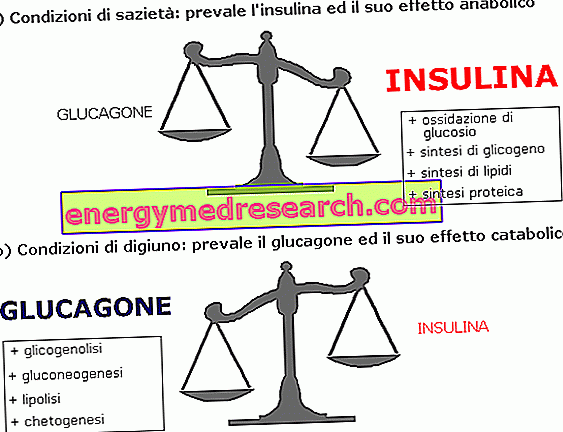What's this?
The " 5 days later pill " is a drug used for emergency contraception, ie after a risky (unprotected) sexual relationship or following the failure of a contraceptive method.
Taken within 120 hours (ie 5 days) of the report, this medicine can prevent an unwanted pregnancy if, for example, a condom has broken or slipped off, when a woman realizes she has forgotten to take the pill or to replace the patch contraceptive or, in the worst case, if the relationship was imposed by violence.
The "5 days later pill" (trade name ellaOne® ) has the function of interfering with the mechanisms of ovulation, in such a way as to prevent the oocyte fertilization.

How does it work
The "5 days later pill" is a pharmacological intervention ( hormonal ) indicated in case of unprotected sexual intercourse or failure of a contraceptive method, to reduce the possibility of an unwanted pregnancy.
The "5 days later pill" is based on ulipristal acetate . From a pharmacological point of view, this active principle belongs to the category of anti-progestins, that is those molecules that counteract the effect of progesterone, a fundamental hormone to create the conditions suitable for fertilization and implantation.
- The ulipristal acetate acts by binding with great affinity to the progesterone receptor, to try to inhibit or delay an eventual ovulation, by suppressing the elevation of the luteinizing hormone (LH). The "5 days later pill" thus prevents the oocyte expelled from the ovaries, to begin its journey through the tubes and reach the uterus, can be fertilized by sperm of male origin.
Although it can be taken up to 120 hours after the relationship at risk, emergency contraception is the more effective the sooner it is taken (preferably within 12-24 hours of the report): the success rate reaches 95-98% of cases.
Obviously, if ovulation had already occurred, the possibility of avoiding pregnancy would be reduced, which makes it a method not without a failure rate. If the spermatozoa are able to meet the oocyte and fertilize it, then the drug has no effect (it does not work in case of pregnancy already in place).
When to be hired
The "5 days after pill" can be taken no later than 5 days ( 120 hours ) after unprotected intercourse or when it is thought that the contraceptive method adopted during intercourse did not work properly.
This means that the ulipristal acetate can prevent an unwanted pregnancy in the following cases:
- The condom has not been worn since the beginning of the relationship or it has been broken or marched;
- The contraceptive ring has been expelled;
- The patch came off or was not reapplied after the 7-day break;
- The woman realizes she has forgotten to take the daily contraceptive pill or episodes of diarrhea or vomiting have occurred after taking it;
- The woman suffers an unwanted and / or imposed relationship with violence.
It should be emphasized that the "5 days later pill" is not a contraceptive method to be used routinely, but only in case of emergency.
How to assume
The "five-day pill" can be taken at any time during the menstrual cycle. The treatment consists of a tablet to be taken orally as soon as possible, but no later than 120 hours (5 days) after sexual intercourse. The drug can be taken at any time of the day, on a full or empty stomach.
- In case of vomiting within 3 hours of taking the tablet, a second tablet should be taken as soon as possible.
In any case, the "5 days later pill" cannot be used regularly, neither? at short intervals.
What is good to know
Before taking it, it is important to know that the "5 days later pill":
- It has been approved to prevent a pregnancy within 120 hours (5 days) from unprotected sexual intercourse (for example, the condom was broken or the pill was forgotten) and is absolutely not intended to interrupt a pregnancy in act ( has no abortive effect );
- It cannot be used as a normal contraceptive, but only and exclusively in the event of an unpredictable emergency;
- The contraceptive action is limited to the only sexual relationship at risk had before the intake. It is not effective if other relationships occur during the same cycle;
- It does not guarantee protection from sexually transmitted diseases (such as, for example, HIV infection, Chlamydia, genital herpes, genital warts, gonorrhea, hepatitis B and syphilis);
- It has no negative effects on subsequent fertility;
- Although effective in 97% of cases, it does not prevent pregnancy in all circumstances ; if after taking it, there is a delay of more than 5 days, it is necessary to exclude conception.
What it takes to buy it
From 9 May 2015, in Italy the "five-day pill after" can be purchased directly at the pharmacy, as the medicine has become without a prescription or prescription, upon presentation of a valid identity document, which certifies the greater age of the purchaser.
This decision of the AIFA (Italian Drug Agency), in line with the regime adopted by other European countries, allows women of age to take the drug (commercially called ellaOne® ) as soon as possible after the report is considered at risk. Furthermore, as is the case in the rest of Europe, in order to have the "five-day pill after" it is no longer necessary to present the urine pregnancy test with negative Hcg beta (as was previously required to exclude the conception preceding the report which it causes the assumption).
The obligation of medical prescription remains, however, for underage girls and for the formulation based on levonorgestrel (active ingredient of the morning-after pill ). It must be remembered that the non-repeatable recipe can be filled out by any doctor, who does not necessarily have to be a gynecologist.
What should those who have not yet turned 18 do? The law clearly allows the prescribing of contraceptives, even emergency ones, to underage girls. To buy the "five days later pill", these must have the non-repeatable prescription, which your primary care physician fills out and the pharmacist withdraws when you deliver the medicine.
In case of extreme necessity or outside the clinic hours, for the prescription it is possible to apply as an alternative to the public counseling center, the medical guard and, finally, the emergency room.
Note : emergency contraception offers women an additional choice . Clearly, conscientious objection is allowed, but the health care provider is obliged to provide all the information, so that the patient can receive the prescription and the drug in good time.
How much
The ellaOne® pack - containing a 30 milligram tablet of ulipristal acetate - costs approximately € 26.90.
Differences with the morning-after pill
- The morning-after pill (based on levonorgestrel ) is a drug approved for emergency contraception, which is administered no later than 72 hours (ie 3 days) following the sexual relationship considered at risk, to avoid an unwanted pregnancy. This medicine requires a medical prescription .
The morning-after pill is able to prevent the fertilization of the egg only if taken before the hormone LH is raised; in fact, levonorgestrel cannot block ovulation if it has already started. Therefore, there is a good certainty of the drug's efficacy, especially 48-52 hours, before the process that makes the mature egg cell available at conception. The morning-after pill, therefore, must be taken more quickly than the "5-day pill".
- The " 5 days later pill " based on ulipristal acetate, on the other hand, is able to act by modifying the activity of the hormone progesterone, delaying the process that leads to ovulation. The latter formulation, in fact, has a more targeted and powerful effect on the receptors of this hormone and, if taken immediately before the time when ovulation is foreseen (ie when LH has already begun to increase), the drug is able to postpone the follicular rupture for a few days.
The "5 days after pill" is three times more effective than the levonorgestrel-based formulation, if taken within the first 12-24 hours from the risk ratio, and acts for longer (up to 120 hours against 72). The "5 days later pill" can be bought at the pharmacy without a prescription (except the woman is of age).
Neither of the two pills should however be confused with the abortion pill, RU-486, a drug used to stop an already started pregnancy. In fact, the latter drug induces an abortion causing the embryo to detach from the uterine mucosa. In Italy, RU-486 can be taken, exclusively in the hospital, by the seventh-ninth week of pregnancy, as an alternative to surgical abortion.
Remember! Although the morning-after and five-day pills can be taken respectively within 72 (3 days) or 120 hours (5 days) of the risky sexual relationship, they should be taken as soon as possible: the more hours pass, the more their effectiveness decreases .
Contraindications and interactions
The "5 days after pill" is contraindicated in ascertained pregnancy : in this case, in fact, it is ineffective.
In some cases, the use of this medicine can temporarily reduce the effectiveness of regular hormonal contraceptives, such as pills and patches. For this reason, it is advisable to use a reliable barrier method of contraception (for example, a condom) until the next menstrual cycle.
Furthermore, the "5-day pill" should not be taken concurrently with a levonorgestrel- based contraceptive, as the mechanism of competition between the two drugs would reduce its effectiveness.
Other drugs that may interact with the "5-day after pill", including those intended to treat epilepsy (phenobarbital, phosphenitoin, phenytoin, oxcarbazepine, primidone and carbamazepine), HIV infections (ritonavir, efavirenz and nevirapine) and some bacterial infections (rifabutin, rifampicin and griseofulvin). Attention should also be paid to herbal products containing Hypericum perforatum (St. John's wort).
The "5 days after pill" is not recommended in the presence of severe asthma, lactose intolerance and hypersensitivity to the active substance or to any of the excipients . The drug should not be taken by women suffering from severe liver dysfunction and malabsorption syndromes (such as Crohn's disease) which can compromise its effectiveness. In all these cases, therefore, it is advisable to contact your doctor to decide which solution to adopt, if there is a need to take emergency contraception.
Furthermore, after taking the drug, breastfeeding is not recommended for a week.
Side effects and risks
As with all drugs, after taking the "5 days later pill" there is the possibility that side effects, such as spotting, headache, nausea, occur with relative frequency (may affect up to 1 in 10 people), vomiting, mood swings, lower abdominal pain and feeling of exhaustion. These effects generally disappear 48 hours after taking the pill and are almost always mild.
Moreover, in the month of recruitment, irregularities in the next menstrual cycle may occur (advances or delays, painful or prolonged periods, vaginal irritation or loss, decreased or increased libido, more abundant flow, etc.).
Other adverse events for this type of medicine are less frequent (1/100) and include breast tenderness, muscle pain, dizziness, diarrhea and hot flushes.
During the clinical studies carried out before marketing the drug, no adverse effects of such importance as to suspend the trial were found. In general, therefore, the "5 days later pill" is well tolerated and effective, but an emergency intervention remains that cannot be used routinely.
Importance of contraception
The "5 days later pill" should be used as a method of contraception only and exclusively in an emergency . This drug, in fact, should never be an alternative to the "classic" contraceptives, especially considering that there are cheaper and safer methods to avoid an unwanted pregnancy.



